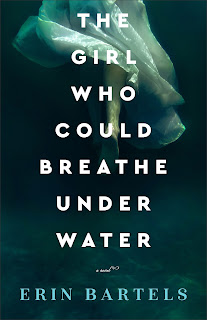Welcome to a very special Goal Setting Fridays!!!
Today, I'm excited to introduce you to
my dear friend
Be sure to read her fabulous bio at the end of this post,
and I also invite you to check out the
Book Review I wrote of her first book
- The Living Diet -
HERE.
Please welcome Martha,
and enjoy her inspiring post!
GETTING ULTRAREAL
By Martha Tatarnic
I am not naturally athletic. I’m the kid who was picked last for every sports team in gym class growing up. One of the happiest days of my high school career was when I graduated Grade 9 gym and never had to struggle through another class being graded on various forms of hand-eye coordination, running, jumping and throwing.
Nobody has been more surprised than I to find myself as a runner in my adult life. Running has now been a consistent part of my life for the better part of two decades, and I have embraced long distance running in the last ten years. In 2021, I trained for and ran my first marathon. I enjoyed it so much that I’m training for another one now.
Running is stress relief, it is prayer.
It is the space I need in order to be able to reflect, rather than just react,
to the circumstances of my life.
When I make room for running,
I seem to have room for all of the other family, church, work,
community commitments that I also have on my plate.
I know all of these things about running. I know why I do it and why I love it. And still, every time that I go out, putting foot to pavement, I can feel my mind rebel against the exercise. Sometimes, when I am pushing myself to be faster or to run longer, my body starts to rebel too. But mostly - and this sounds somewhat counter-intuitive - running is a mind game.
Training for a marathon involves a regimented schedule for slowly building up my weekly mileage, as well as inching my long-run mileage closer and closer to the 42km mark needed to complete a marathon. Each day that I head out to tackle my planned mileage, I have to fight the monkey on my shoulder nattering in my ear about the cramping I am sure I can feel in my side, the impossibility of the miles stretching out in front of me, the labour of breathing that already threatens to derail my plans, and the sure and certain feeling that I have to pee, even though I went just before leaving the house. I worry that it’s too hot or too cold or too windy or too slippery; I don’t believe that I can complete the assignment in front of me.
Ultrarealism* is a powerful technique from the realm of endurance sports,
and it has been a game changer for me - as a runner, and also as a person.
It is the practice of seeing, accepting, and embracing the actual circumstances in which you find yourself.
It is about responding to the moment in front of you rather than the moment you worry might be coming
or which circumstances you wished were different.
When people talk about positive thinking, I instantly lose interest.
Ultrarealism, however, isn’t about training the mind
to squeeze reality through the frames of any sort of rose coloured glasses.
It’s about getting real.
It is easy as a runner to expend large amounts of energy and anxiety worrying about what might happen or wishing that things could be different from what they are when you have twenty, thirty or forty kilometers stretch in front of you. If we instead train our minds to focus on what is actually happening and how we really feel, then a new sort of freedom opens up.
I might get freaked out about how my breathing is uneven. I might feel despair about the spitting rain outside and how slowly the first kilometer seems to have gone when I still have twenty-nine to go. But while these things about breathing and rain and mileage might be true, I can choose to note that my leg muscles feel strong, the rain is refreshing, and I have the great privilege of being able to run. I am not just not dying; I am not just safe and okay. I am running and it feels good.
“I’m doing it!” my friend Sarah uses as her power statement. It’s an ultrareal power statement. It’s not the power of positive thinking. It’s a statement of fact. For all of the worry or uncertainty or reluctance that we might feel about putting on our shoes and tackling some mileage, here we actually can find ourselves - out running. We are out here. And we are doing this.
The benefits of ultrarealism don’t just apply to running.
Instant gratification is easy to come by, but a lot of what makes life worth living requires a measure of patience and openness to stick it out past beginnings that aren’t comfortable or fun. Whether you want to learn a new skill, take on a creative project, meet your professional goals, improve as an athlete, or even just increase your capacity for prayer, the practice of getting ultrareal can provide perspective that can allow you to overcome the challenges of your own mind convincing you that you can’t do a certain thing.
Ultrarealism is like the famous serenity prayer:
God grant me the courage to change the things that I can,
the serenity to accept the things I can’t,
and the wisdom to know the difference.
There is much about the circumstances of a run - not to mention the circumstances of my life, and all of the other challenges that I take on - that I can’t change or control, and within all that isn’t shaped and dictated by me is the choice to keep one foot going in front of the other.
Somewhere in the letting go and the choosing anyway is a wild and surprising joy.
MARTHA TATARNIC - Author. Priest. Runner.
Martha’s second book - Why Gather? The Hope and Promise of the Church - will be published this June. She has also authored The Living Diet: A Christian Journey to Joyful Eating, an exploration of our relationship with food and our body through a Christian perspective. She is the lead priest of a thriving downtown Anglican church in St. Catharines Ontario, St. George’s. She writes a regular blog for the Anglican Church of Canada, which can be found at medium.com/@mtatarnic Details on writing, speaking engagements and her author’s journey can be found at https://MarthaTatarnic.ca
* Matt Fitzgerald coins this term “ultrarealism” in his book, The Comeback Quotient, 2020, as a mental fitness technique which he applies particularly to endurance sports. I (Martha) adapt his definition slightly in applying it to my life.










